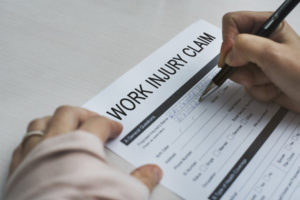Workers Comp Insurance From an Employer’s Perspective
March 17, 2022 | Workers' compensation
What do you do when an employee claims they have been injured while on the job? While you may have done everything possible to provide your employees with a safe working environment, accidents can still happen. When they do it is important as an employer to be prepared. This is especially because almost every state requires employers to carry workers’ compensation insurance to compensate employees that are injured while on the job. Below we discuss workers comp insurance and some things you should know as an employer.
Why you should carry workers compensation insurance as an employer
Workers compensation is designed to provide injured workers with a financial cushion in the event that they are injured while on the job. While workers compensation is viewed to be primarily beneficial to workers, there are many benefits of seeking workers’ compensation insurance as an employer.
- It is a requirement of the law
Businesses and other commercial entities must always ensure that they adhere to the requirements of the law. They otherwise stand the risk of being shut down, fined or even worse serving jail time. Most states require employers to carry workers’ compensation. Failure to do so can result in hefty penalties. You can avoid all these problems by simply investing in workers’ compensation insurance.
- Workers’ comp insurance will protect your employees
While providing your employees with a safe work environment is a step in the right direction, ensuring that they are covered with workers’ compensation is even better. Injuries can occur even under the safest conditions. Employees often aren’t in the position to cover the hefty medical expenses or recover from the lost wages. Workers’ compensation will help to sustain your employee while they are recovering from injury.
- Workers’ compensation insurance will protect you
If you do not have workers’ compensation insurance, your business will be held liable for the injury or death of your employee. This can be financially devastating for your organization. Your business will have to cover the injured worker’s expenses and damages. These include the cost of medical treatment, lost wages and much more. The expenses can be even higher if an injured employee dies as a result of their injuries. You would be forced to compensate the family with a hefty sum.
Investing in workers compensation will help to protect your business. It will reduce your risks and ensure continuity despite the accident.
What is covered by workers’ compensation?
Many employers wonder what qualifies for cover under workers compensation. This is important as it determines whether or not your insurance will have to pay the injured employee.
In general, all accidents and incidents occurring at work that result in an injury or illness of an employee are covered by workers compensation. These include:
- Sudden and unexpected accidents such as slip and fall accidents
- Cumulative trauma which results in injuries after a long time. They include repetitive stress injuries
- Occupational diseases which are caused as a result of the conditions at the workplace. For example employees may develop lung disease as a result of inhaling toxic fumes.
Workers’ compensation is awarded even when the accident was not caused by the employer. However, this doesn’t mean that injured employees are always awarded compensation for injuries that occur in the work place. Many states have laws that deny coverage of injured employees under certain circumstances. These include:
- Injuries or illness that is self-inflicted
- Injuries or illness that resulted from a fight that was started by the injured employee
- Injuries or illness that occurred while the employee was involved in committing a crime
- Injuries or illness that occurred while the employee was violating company policies
- Accidents that occur when employees are ‘fooling around’
Can an employee sue after receiving workers’ compensation?
Workers’ compensation protects employers from having to compensate employees for their injuries straight out of their pocket. It doesn’t however protect employers from lawsuits against them related to their injuries. Employees can in fact file a lawsuit against their employer if they have been hurt at work and believe that their employer is responsible for their injuries. Some states allow employees to sue their employers for negligence. Employees however, have to prove that their employer was negligent and this negligence resulted in the injuries they suffered.
Employees can also file lawsuits against third parties such as manufacturers whom they hold responsible for the accident. For example, if the employee’s injuries were the result of using a defective product, they can seek compensation for the use of this product from the manufacturer.
Conclusion
It is important as an employer to provide your workers with workers’ compensation coverage. This will not only be beneficial to your employees but also protect your business. You must also strive to provide your employees with a safe work environment to avoid lawsuits in the event of an accident.

Workers Comp Employer

